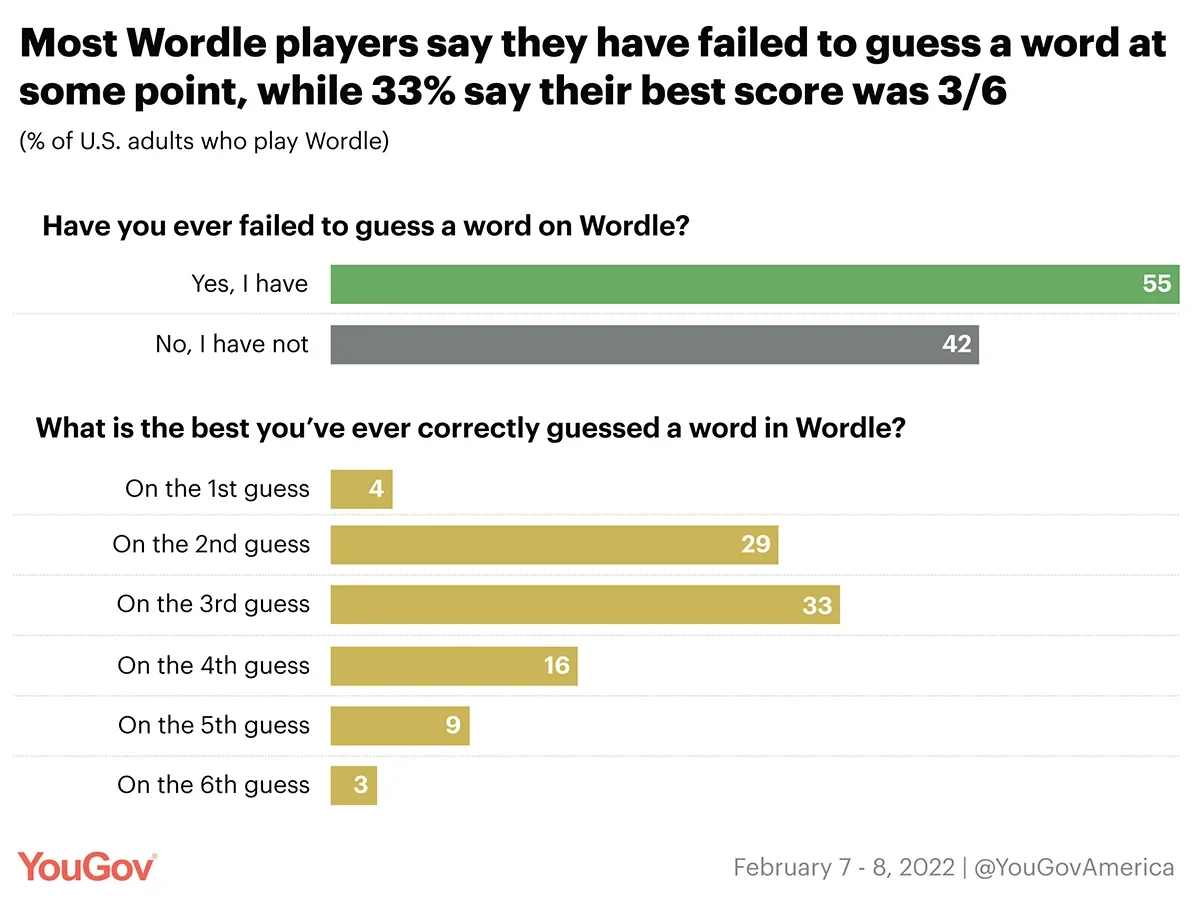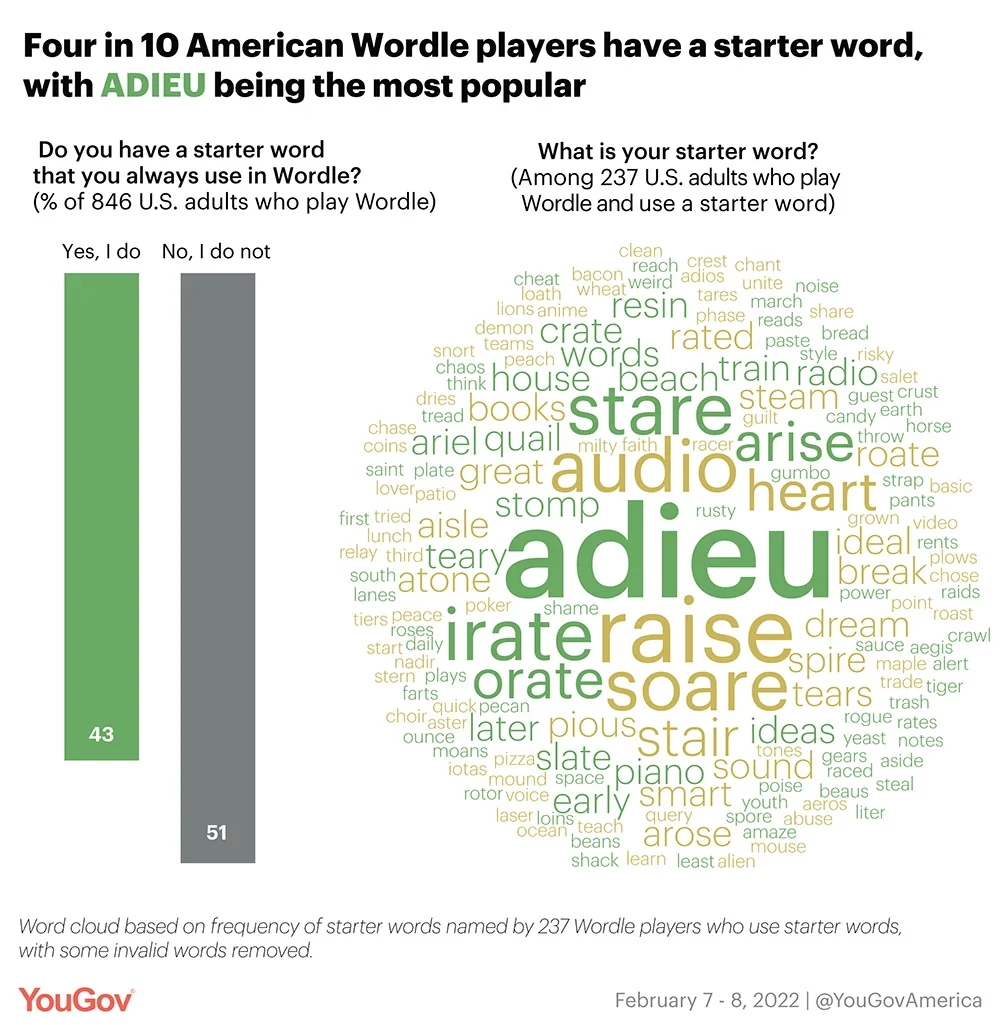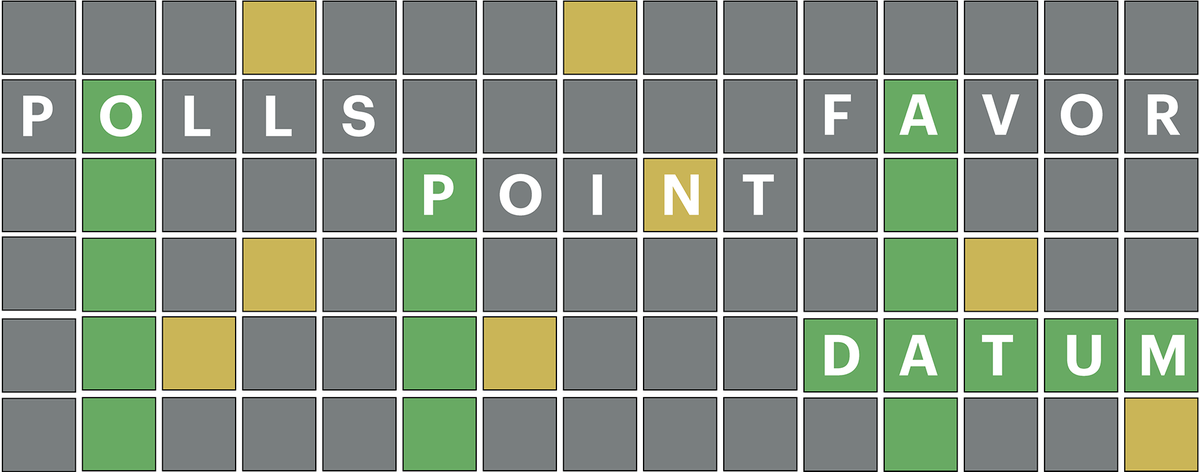In the hit puzzle game Wordle, players have six chances to guess a five-letter word. By now, you’ve likely seen the grids of green, yellow, and gray tiles that give users hints about how close their guesses are getting to the correct answer — and the versions without spoilers that allow people to share their scores with friends. Last month, the free game was purchased by The New York Times for a dollar amount “in the low seven figures,” prompting worries that the Times eventually would start charging users to play.
Last week, YouGov asked 846 active Wordle players in the U.S. about their playing habits, their go-to starting words, and whether they would be willing to pay for the currently free word game.
When are Americans playing Wordle?
There is only one Wordle game released per day — at midnight — and most Americans who still play (57%) say they attempt to complete the puzzle every day. Another one-quarter (25%) are playing Wordle most days, and 18% say they play less frequently.
Among those who play every day, most (57%) say they have already played Wordle by noon on a typical day. One in 8 players (11%) are pulling up the game at midnight or shortly after, while 18% tend to play before 9 a.m. About one-quarter (26%) are guessing words between 9 a.m. and 12 p.m., and 31% are playing between 12 p.m. and 5 p.m. (15%) or later (16%).
Wordle high scores: 29% of American Wordle players say they’ve scored a 2/6
For many American Wordlers, part of the craze is sharing daily scores with friends, family, and other colleagues. One-quarter of Wordle players (25%) say they share their Wordle score in messages or group chats either “every time” or “most times.” But the post-puzzle-brag is not for everyone: 32% do this “sometimes” or “rarely,” and 42% “never” do this. There was no relationship between people’s best score and their willingness to share with friends.
Those who have stuck with Wordle have some level of success with it. Players get six tries to get the day’s word. While most (55%) have been stumped at some point — earning a dreaded X/6 — there have also been respectable high scores, too. About three in 10 (29%) say they’ve scored a 2/6, and one-third (33%) have, at best, nailed the word on their third guess. The highly unlikely scenario of guessing the word randomly on their first attempt is something that 4% of Wordle users say they’ve done.

Two in five American Wordlers have a starter word
To optimize their chances of solving the Wordle quickly, many users have a consistent “starter word” that they deploy as their initial guess. About two in five Wordle players (42%) use a specific starter word. The most popular opening words are often stuffed with vowels and the common consonant letters in American English: R, S, and T. Among the most common are “ADIEU,” “RAISE,” “IRATE,” “SOARE,” “STARE,” and “AUDIO.” A few especially tricky Wordle rounds have emerged when the five-letter word contains duplicate letters — something that Wordle does not alert its users to. More than one-third of players (37%) want Wordle to give an indication if a word is using the same letter twice or more. Two in five (41%) say Wordle should continue not giving any indication that a word is using the same letter twice or more. Another 15% would ban words that use the same letter twice or more.

If Wordle costs money, would users pay?
The New York Times recently purchased Wordle with a promise that the game would “initially remain free to new and existing players.” Many have speculated that the puzzle game will eventually be moved behind a paywall, meaning users would have to buy a subscription in order to access the game.
Only a small subset of current Wordle users say they’d pay for the game, however. About three-quarters (76%) say they would not be willing to pay for Wordle access. One in 12 (8%) current users would be willing to spend $1 to $3 per month, and 10% would pay $4 to $6 per month. Just 3% would be willing to pay $7 or more to keep puzzling.
— Matthew Smith contributed to this article
See the toplines from this YouGov Poll
Related: Wordle: starter words, hard mode and X/6 - how are Britons playing the hit game?
Methodology: This YouGov survey was conducted among a representative sample of 846 U.S. adults who indicated that they had played Wordle before and still play it. These YouGov members were interviewed on February 7 - 8, 2022. Respondents were previously interviewed by YouGov on February 1 - 2, 2022, about whether they played Wordle. For this analysis, YouGov focused only on the responses of the 846 re-contacted panelists in the February 7 - 8 survey. Both surveys were carried out through YouGov Direct. Data is weighted on age, gender, education level, political affiliation, and ethnicity to be representative of adults in the United States.
Image: YouGov











